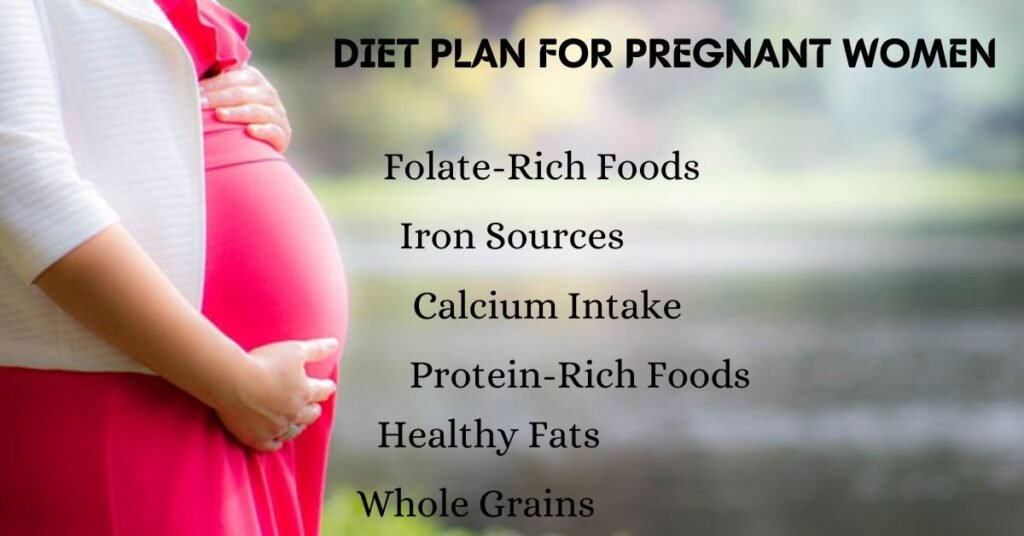A well-balanced diet during pregnancy is essential for the health of both the mother and the developing baby. A variety of nutrients are needed to support the growth and development of the fetus, as well as to ensure the mother’s overall well-being. Here’s a comprehensive diet plan for pregnant women:
- Folate-Rich Foods:
Folate helps prevent neural tube defects in the baby. Include foods like spinach, lentils, beans, and fortified cereals in your diet. - Iron Sources:
Iron is crucial for preventing anemia. Consume lean meats, poultry, fish, fortified cereals, and legumes to meet your iron needs. - Calcium Intake:
Calcium is vital for the baby’s bone development. Incorporate dairy products, fortified plant-based milk, and leafy greens like kale and broccoli into your meals. - Protein-Rich Foods:
Protein supports the growth of fetal tissues. Include sources like lean meats, poultry, fish, eggs, dairy products, nuts, and seeds. - Healthy Fats:
Omega-3 fatty acids aid in the baby’s brain and eye development. Eat fatty fish like salmon, chia seeds, walnuts, and flaxseeds. - Whole Grains:
Complex carbohydrates provide sustained energy. Choose whole grains like brown rice, whole wheat bread, quinoa, and oats. - Plenty of Fiber:
Fiber helps prevent constipation, a common issue during pregnancy. Opt for fruits, vegetables, whole grains, and legumes. - Vitamin C-Rich Foods:
Vitamin C aids in iron absorption and boosts the immune system. Consume citrus fruits, strawberries, bell peppers, and tomatoes. - Hydration:
Drink plenty of water throughout the day to stay hydrated and support the increased blood volume during pregnancy. - Healthy Snacking:
Opt for nutrient-rich snacks like yogurt, fruit, nuts, and whole-grain crackers to keep energy levels stable. - Limit Caffeine and Sugar:
Moderate your caffeine intake and reduce sugary foods to maintain stable blood sugar levels. - Foods to Avoid:
Avoid high-mercury fish (shark, swordfish, king mackerel), raw or undercooked seafood, unpasteurized dairy, deli meats, and excessive amounts of artificial additives. - Supplements:
Consult your healthcare provider about prenatal vitamins to ensure you’re getting the necessary nutrients, including folic acid and iron. - Small, Frequent Meals:
Eating smaller meals throughout the day can help with digestion and prevent excessive weight gain. - Listen to Your Body:
Pay attention to hunger and fullness cues, and eat when you’re hungry. Pregnancy is not a time for weight loss; focus on nourishing yourself and your baby.
Remember, every woman’s nutritional needs during pregnancy are unique. It’s crucial to work closely with your healthcare provider or a registered dietitian to create a personalized diet plan that meets your specific requirements and addresses any potential complications. Prioritize a balanced diet, proper hydration, and self-care for a healthy pregnancy journey.


